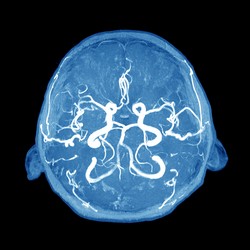Blocking the channels leading to neurodegeneration
By producing electrical changes in the cell, the calcium-activated potassium channel (KCa3.1) regulates calcium action and inflammatory activity in the central nervous system. Channel functions change in a range of metabolic and neurodegenerative diseases characterised by chronic inflammation. Ion channel dysregulation is relevant to the onset and progression of ischaemia and microglia-mediated neuron survival or loss. The BRAINIK (Identification and validation of cerebral KCa3.1/KCa2.3 potassium channels as drug targets for the prevention and treatment of cerebral ischemia associated with diabetes and Alzheimer’s disease) initiative investigated the involvement of the KCa3.1 protein to look for potential therapies. The researchers looked at mouse and human cerebrovascular tissue with diabetes type 2 and Alzheimer’s disease. They conducted electrophysiological, molecular biological, and imaging studies using genetic and pharmacological tools for identification and validation of potential KCa3.1 protein targets in the tissues. The team developed a mouse model that can be induced to overexpress KCa3.1 to investigate the pro-inflammatory action of the protein and its role in neurodegeneration. Overexpression resulted in a strong inflammatory response in several organs and changes in muscle movement. BRAINIK have developed and patented several KCa3.1 inhibitors known as gating modulators. Currently under trial, their potential to alleviate disease in preclinical experimental studies and in model patients’ cell systems as a translational approach is being evaluated. Proof of efficacy has been obtained for some of the developed compounds in mouse models of multiple sclerosis and amyotrophic lateral sclerosis. In healthy mice taking the inhibitors, there was an improvement of learning and physical activity. Dissemination included three open-access papers in the high-profile PLOS ONE journal. The studies range from the effects of increased expression of KCa3.1 in renal cancer and its involvement in diabetes and obesity, emphasising the physiological importance of this molecule. The BRAINIK project research results provide strong evidence for the disease-alleviating efficacy of KCa3.1-inhibitors for the treatment of neuroinflammation and degeneration. As KCa3.1 regulates membrane potential and signalling in a range of cells, extension of this knowledge platform could have far-reaching impact on other diseases such as asthma, atherosclerosis and autoimmunity.







